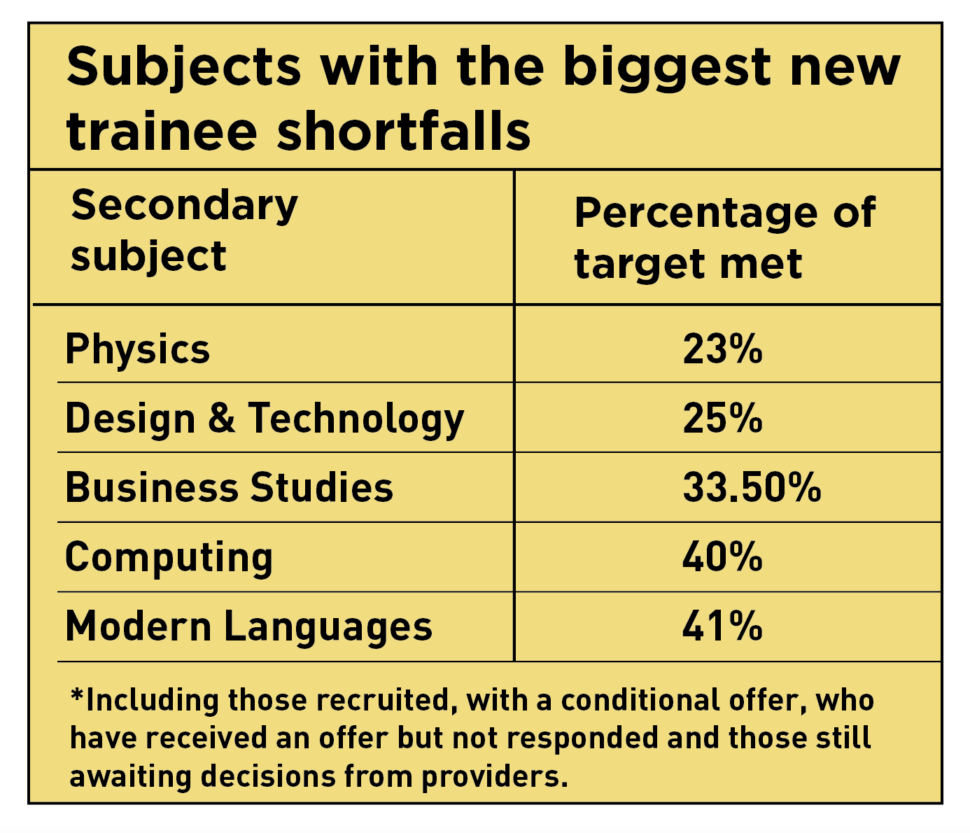New education secretary Kit Malthouse has been urged to prioritise teacher shortages as new analysis suggests the government could recruit nearly 6,000 fewer secondary trainees than required this year.
It would mean ministers missing recruitment targets for the ninth time in ten years. Teacher retention rates are also worsening with a big jump in vacancies this year, suggesting the crisis is really starting to bite.
A Schools Week analysis of the latest recruitment data published on August 15 – a fortnight before schools reopened – suggests only 73 per cent of this year’s postgraduate initial teacher training (PGITT) secondary target will be met.
But some subjects are likely to see the brunt of the shortfall, with only 25 per cent of physics teachers recruited so far.

A quarter fewer secondary teachers have also been recruited than at this time last year – when the target was also missed.
Professor John Howson, the chair of the teacher vacancy website TeachVac, said solving shortages “must be No 1” in Malthouse’s inbox.
“Schools face a battle to recruit teachers during 2023 unless the recession encourages more to return to teaching. At present, that is wishful thinking and not a way to staff our schools.”
Many offer holders don’t have confirmed places
The August data for the 2022-23 school year – the last to be published before the new school year – shows just 13,970 postgraduate secondary candidates had been offered places. The Department for Education wanted 20,945.
Of those, 7,156 trainees had conditional offers (51 per cent), while 4,844 (35 per cent) were recruited.
A further 177 had not responded to an offer, while 1,793 (13 per cent) were awaiting decisions.
However, the data does not include Teach First or those who have applied directly through their provider.
Few candidates apply directly through their provider, but 1,294 new secondary trainee teachers were recruited through Teach First last year, making up 6 per cent of the overall secondary teacher target.
If their recruits make up the same percentage this year, that would leave a shortfall of 5,718 trainees (27 per cent of the target).
But Teach First launched a new autumn institute on top of its usual offer after a “challenging year” for recruitment, suggesting it might also fall short.
Recruitment numbers are ‘ominous’
Sara Tanton, the deputy policy director at the Association of School and College Leaders, said the analysis was “ominous”. Many schools would have to increase class sizes and use supply staff and non-subject specialists.
Recruitment is getting worse. As of August 16 last year, 16,070 secondary trainees with a secure or conditional place had been recruited, compared with 12,000 by August 15 this year – a 25 per cent fall.
The Initial Teacher Training Census, published in December, showed that just 16,571 secondary trainees were recruited last year – 82 per cent of the target.
Long-standing shortage subjects will also feel the pinch; 23 per cent of physics teachers have been recruited so far, 25 per cent of design and technology.
Subjects including computing, modern foreign languages, music, geography, English, RE and biology are likely to under-recruit. Classics is the most oversubscribed, with double the required number of trainees signed up.
Teacher shortages elsewhere, too
Teacher recruitment issues are not isolated to the UK. A recent Financial Times analysis found that more than 80,000 teaching positions remain unfilled in Germany, Hungary, Poland, Austria and France.
British international schools also need to recruit an additional 18,000 teachers in the next ten years, according to a recent report from the Council of British International Schools (Cobis).
But a survey of international school leaders earlier this year suggested more staff were actually planning to return to the UK than in previous years.
Fiona Rogers, the council’s deputy chief executive, also said the DfE’s plan for an international qualified teacher status (iQTS) could lead to “a great deal of movement in both directions”.
A DfE spokesperson said recruitment had been challenging, but bursaries of up to £24,000 and scholarships would “encourage talented trainees to key subjects such as chemistry, computing, mathematics and physics”.
















Prognosis for education = stuffed.
The list is almost endless for reasons not to join.
I’m out within 4 months. The stress is literally killing me. Irregular heartbeat, toilet issues, sleepless nights etc At the end of a 27 year career. Joined for the right reasons and getting out for the wrong ones. Thanks politicians, you made it a hell hole.
So… Let me get this straight… There is a shortage in recruiting and Student Finance England is making candidates lives a living hell…
I never mentioned “Student Finance”. I simply stating that the working conditions in schools drive teachers out. 1/3 of new teachers leave the teaching profession within five years etc etc. Given the explosion in graduate numbers in the last two decades it’s simply embarrassing government can’t make it sufficiently attractive to graduates to join or to stay.